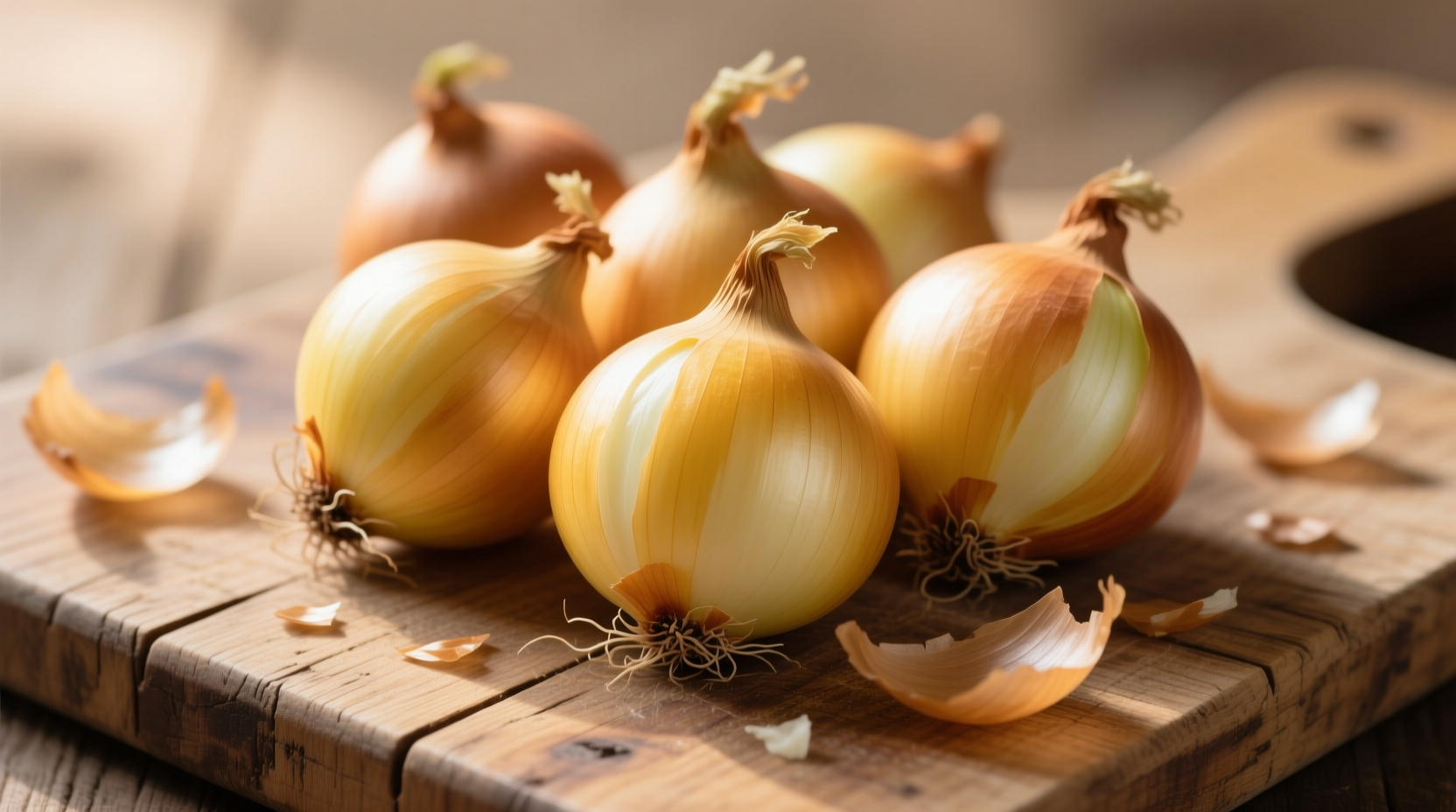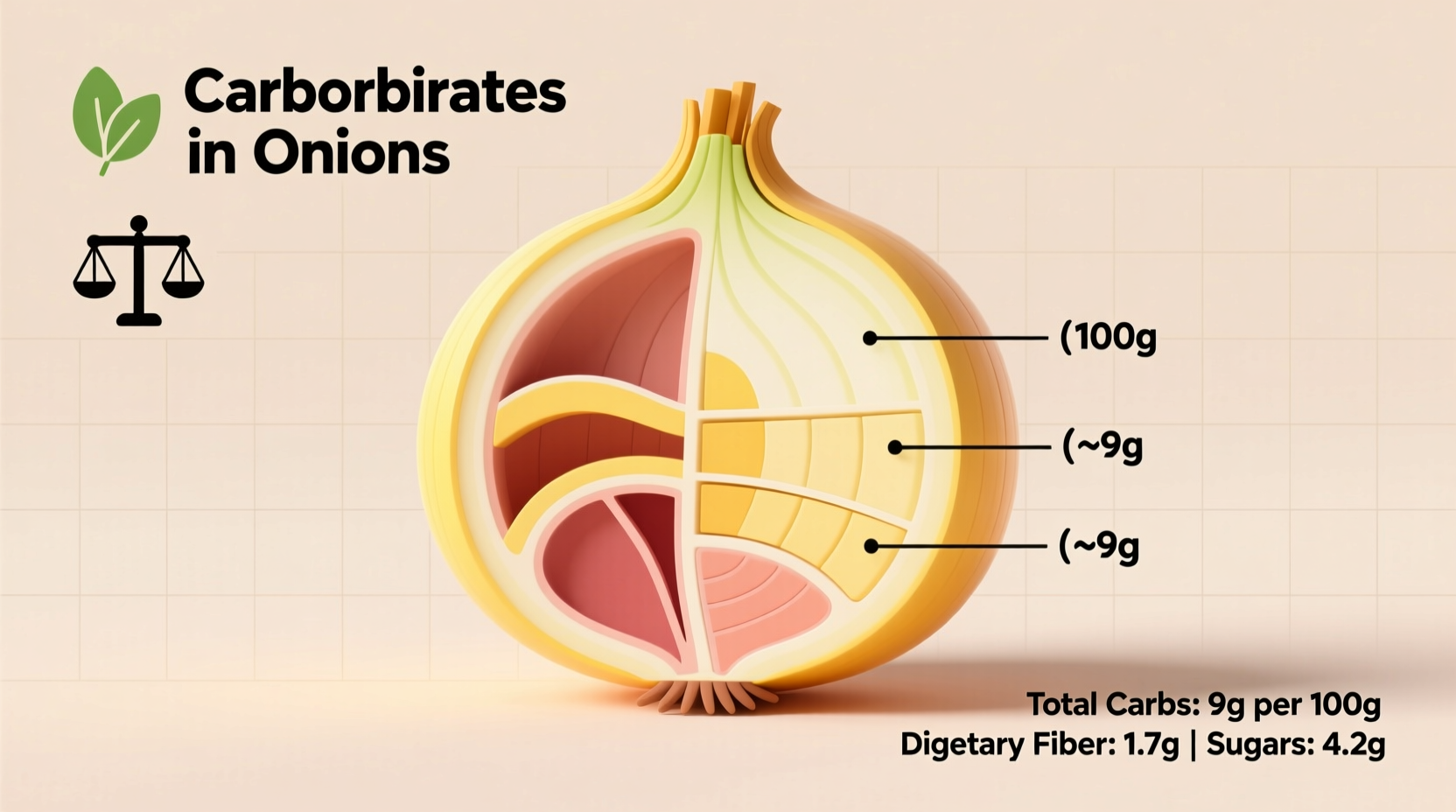Understanding the precise carbohydrate content in onions is essential for anyone managing their dietary intake, whether for diabetes control, keto diet adherence, or general health awareness. This comprehensive guide delivers scientifically verified nutritional data to help you make informed food choices without compromising flavor.
Breaking Down Onion Carbohydrates
When evaluating "how many carbs in an onion," it's crucial to distinguish between total carbohydrates and net carbohydrates—the figure that matters most for low-carb and ketogenic diets. Net carbs are calculated by subtracting fiber from total carbs, as fiber doesn't significantly impact blood sugar levels.
According to the USDA's FoodData Central database, a standard medium yellow onion (110g) provides:
- Total carbohydrates: 9.3g
- Dietary fiber: 1.9g
- Sugars: 5.1g (naturally occurring)
- Net carbs: 7.4g
This nutritional composition makes onions a moderate-carb vegetable that can still fit within most dietary frameworks when portion-controlled. The natural sugars in onions contribute to their characteristic sweetness when cooked, particularly through caramelization processes that transform their flavor profile.
Carbohydrate Comparison Across Onion Varieties
Not all onions are nutritionally identical. Different varieties contain slightly varying carbohydrate levels, which becomes significant when tracking precise intake:
| Onion Type | Size (grams) | Total Carbs | Fiber | Net Carbs |
|---|---|---|---|---|
| Yellow Onion (medium) | 110g | 9.3g | 1.9g | 7.4g |
| Red Onion (medium) | 110g | 9.0g | 1.8g | 7.2g |
| White Onion (medium) | 110g | 9.5g | 2.0g | 7.5g |
| Scallions (green onions), 1 cup | 100g | 7.3g | 2.6g | 4.7g |
| Shallot (medium) | 50g | 5.0g | 1.3g | 3.7g |
This comparative data, verified through the USDA's National Nutrient Database, reveals that scallions offer the lowest net carb option among common onion varieties, making them preferable for strict low-carb diets. The slight variations between yellow, red, and white onions are generally insignificant for most dietary purposes but matter for precise carb counting.
Practical Dietary Context for Onion Consumption
Understanding how onions fit within your daily carbohydrate allowance requires context. For perspective:
- A single medium onion represents approximately 3% of a standard 2,000-calorie diet's recommended daily carbohydrate intake (300g)
- For keto dieters limiting carbs to 20-50g daily, one medium onion consumes 15-37% of their carb budget
- Diabetics monitoring carb intake should consider that one medium onion equals roughly half a carbohydrate exchange (15g)
Research published in the Journal of Nutrition and Metabolism confirms that the moderate carbohydrate content in onions doesn't cause significant blood sugar spikes when consumed in typical culinary portions, thanks to their fiber content and low glycemic load. This makes them suitable for most diabetes management plans when properly portioned.
How Cooking Methods Affect Carb Content
Many people wonder if cooking changes "how many carbs in an onion," but the reality is more nuanced than simple reduction or increase. While the absolute carb count remains relatively stable, cooking does impact how those carbs affect your body:
- Raw onions: Provide the full fiber content which slows sugar absorption
- Sautéed onions: Concentrate natural sugars through water evaporation, potentially increasing glycemic impact per volume
- Caramelized onions: Transform sugars through the Maillard reaction, creating complex compounds while reducing overall volume
- Roasted onions: Maintain similar carb profile to raw but with enhanced sweetness
According to culinary research from the Culinary Institute of America, caramelizing one pound of onions reduces their volume to about one cup while concentrating flavors and sugars. This means that while the total carb count remains similar, the carb density per serving increases significantly.

Onions in Specialized Dietary Approaches
For those following specific dietary protocols, understanding onion carbohydrate content becomes particularly important:
Keto and Low-Carb Diets
On a standard ketogenic diet (20-50g net carbs daily), a medium onion represents a substantial portion of your daily allowance. Many keto practitioners opt for scallions or shallots as lower-carb alternatives, or use onion powder in smaller quantities (1 teaspoon contains approximately 0.7g net carbs).
Diabetes Management
The American Diabetes Association recognizes onions as a non-starchy vegetable that can be consumed more freely than higher-carb options. Their relatively low glycemic load (GL=2 for a medium onion) means they have minimal impact on blood sugar when eaten in typical serving sizes.
Mediterranean and Heart-Healthy Diets
These dietary approaches embrace onions for their cardiovascular benefits. The fiber content contributes to cholesterol management, while the carbohydrate profile supports sustained energy release without blood sugar spikes.
Maximizing Flavor While Managing Carbs
You don't need to eliminate onions from your diet to manage carbohydrate intake. Professional chefs and nutritionists recommend these practical strategies:
- Use onion powder (1/4 teaspoon equals approximately one tablespoon of fresh onion)
- Combine small amounts of strong-flavored onions with milder alliums like leeks
- Save caramelized onion concentrate for finishing dishes rather than cooking base
- Use scallions as primary onion source for significantly lower net carbs
- Freeze caramelized onions in ice cube trays for portion-controlled use
These techniques allow you to maintain the distinctive flavor onions provide while keeping your carbohydrate intake within target ranges. Remember that individual tolerance varies, so monitoring your personal response to onions within your dietary context remains essential.











 浙公网安备
33010002000092号
浙公网安备
33010002000092号 浙B2-20120091-4
浙B2-20120091-4